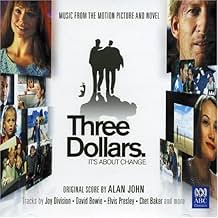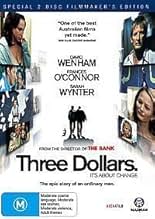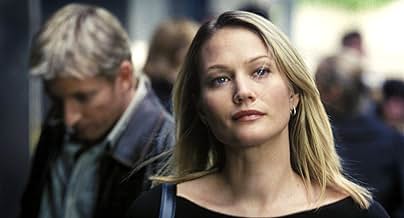अपनी भाषा में प्लॉट जोड़ेंTHREE DOLLARS is the story of Eddie, an honest, compassionate man who finds himself with a wife, a child, and three dollars. Eddie's world revolves around the three women in his life: his br... सभी पढ़ेंTHREE DOLLARS is the story of Eddie, an honest, compassionate man who finds himself with a wife, a child, and three dollars. Eddie's world revolves around the three women in his life: his brilliant wife Tanya, a passionate academic, their six year old daughter Abby, who heightens... सभी पढ़ेंTHREE DOLLARS is the story of Eddie, an honest, compassionate man who finds himself with a wife, a child, and three dollars. Eddie's world revolves around the three women in his life: his brilliant wife Tanya, a passionate academic, their six year old daughter Abby, who heightens the stakes on every decision Eddie makes, and his childhood sweetheart, the beautiful, pr... सभी पढ़ें
- पुरस्कार
- 4 जीत और कुल 5 नामांकन
- Young Eddie's Father
- (as Keiron O'Leary)
फ़ीचर्ड समीक्षाएं
The intricacies of his performance made this movie memorable, moving and fascinating. Other actors are believable and involving. The story is unusual but can easily be identified with. The direction allows the story to flow and makes the most of the emotions.
I can thoroughly recommend this film to anyone who likes to examine the morality behind decisions we make and the effects the decisions have on our futures.
The man is David Wenham (in the role of Eddie Harnovey) and what a performance he gives: an unexciting environmental chemist never evoked such pathos. His altruism, his silly kindnesses, endear him too us; they seem a truly authentic response from a man accustomed to being the charity-giver, and who's sense of himself won't let him admit that the tables have now turned. Living that lie, just for a little while longer, to postpone a hard decision or realisation: this is an experience we've all had, and Wenham plays it so well, subtly hinting at deeper more honest feelings.
Molokai, Getting Square, The Boys, The Proposition, Dust: Wenham has demonstrated an impressive acting range across his oeuvre thus far. Any fan must watch Three Dollars to see yet another thing this man can do with aplomb. His principal companions in this film, Frances O'Connor and Robert Menzies, also turn in fine performances.
I really appreciated Three Dollars' subtle character development. Robert Connolly's screenplay is a fine one, and his unobtrusive visual style really worked for the material. Others on IMDb have criticised this film for being slow, and possessing some pointless episodes; the phrase which best describes these bits is character development! No, this film doesn't have the steroidal plot of your average Hollywood blockbuster. But, by the same token, your average Hollywood blockbuster never comes close to the complex, unglamorous emotional journey depicted here. If you can appreciate a film which doesn't consist of a series of Indiana Jones style trials, you've found a winner. If you don't have an art house sensibility then you might find this film a little diffuse, but I still recommend the challenge.
One only has to read this site's negative reviews to discover this film has a credibility problem. I found it very authentic; two close friends in the employ of Australia's social welfare provider (Centrelink) agree with me. So why is it that people don't believe the events of this film could reasonably happen? The answer is that people expressing such opinions have an unrealistic faith in their employment protections and social welfare system; if one has never lived on the edge, or been in close contact with people who have, one often has such misapprehensions.
Australian corporations regularly lay off large numbers of people: a process euphemistically called 'restructuring'. In Australia, sacking one person is legally fraught: sacking many is legally painless. Companies will announce there intention to do so well in advance, but, in my company at least, you are told you've been sacked on the day that you finish. It's happened twice at my office, and a couple of people have been very surprised.
If your one of those people who didn't really plan for the eventuality, even if you run to the welfare office (Centrelink), you'll run into several weeks delay while your case gets processed; how do you feed your family in the mean time? Most people resort to credit, but not everyone has the luxury; David Wenham's character probably has a ten thousand dollar Amex debt from his recent 'unapproved' business travel.
I have seen a former director, sacked without notice, march into my Fortune 500 company's office, with his entire family, demanding that his entitlements be processed for payment then and there; he forcefully proclaimed for all in the open plan office to hear, "I have to feed these people you know!" How improbable? How true! A sole bread-winner who is absorbed in their work, who is impractical, in debt, and manages his finances from week to week (a character which David Wenham convincingly inhabits) could easily find himself in the Three Dollars situation.
What is so sad about this film is that some people reject it as unrealistic when, in fact, a similar thing happens to an Australian every day. Very soon in Australia there will be no protection against unfair dismissal for employees of companies with up to one hundred people. None whatsoever. This isn't forecasting on my part, but a matter which has already been passed into law. It's easy to see from other comments relating to this film how such laws succeed; our prime minister, 'Honest' John Howard, couldn't possibly sponsor such a bill? Could he? The problem of the disjunction between what is actually true and what people are prepared to believe is a problem faced by better films all the time. The only solution, I suppose, is to keep making them, and thereby change peoples' misconceptions. I encourage overseas watchers to give this story the benefit of the doubt; it is really quite a truthful one, I assure you.
To make an analogy, few Australians would be aware that a pistol with a silencer makes a noise of 110 decibels or more (that's louder than a pneumatic drill or someone shouting in your ear). Many would wonder where the noise came from if Kiefer Sutherland ever used anything like the real thing; and, sure enough, comments would appear on IMDb saying, "How unrealistic was that!" Those reviews that proclaim Three Dollars to be unrealistic are making the same mistake: their point of reference is not reality.
Take the leap with this film, even if what happens offends your belief in the justice of your society: your belief may well be unjustified.
It's good to see a film tackling this unpopular but important subject.
Three Dollars is an affecting character-driven drama. The central performances are truly excellent. It is a melancholy film, but a certain wry humour keeps it afloat. It is saddest in its comment on society; more than a little optimism can be found in Eddie's final situation: provided you value self-realisation over money.
David Wenham can do comedy ("Getting Straight") or drama ("The Boys") equally well, and here he does both splendidly. His Eddie is amiable, a bit of a duffer, but instinctively decent. Thus he cannot approve the dodgy development, despite being aware of the consequences. Wenham, who has great integrity as an actor, has no trouble evoking the pain that can come with doing the right thing. Frances does a fine job as his ambitious but frustrated academic wife, and Joanna Hunt-Prokhovnic (aged nine) as the six-year-old Abby nearly steals every scene she is in. Two minor roles are in the scene stealer category also, David Roberts as Eddie's loathsome boss Gerald and Robert Menzies, unrecognizable as Nick the derro.
The plot leans heavily on coincidence. Not only do Sarah and Nick pop up so providentially, but Sarah is having an affair with Gerald, who happens to have once enticed Tanya away from Eddie with an offer to let her play a female Hamlet while they were all at University together. And of course there is the matter of Sarah's father being the dodgy developer. This all doesn't matter for the story is essentially a fable about keeping one's integrity even when everybody and everything seems to be conspiring to take it off you.
The script is fine though the pace flags at times and one or two of the plot diversions (eg meet the parents) seem unnecessary. There are also some unnecessary flourishes such as the crop-dusting plane attack - an apparent tribute to Hitchcock's "North by North West". Robert Connolly's only previous outing as a feature director was another entertaining modern fable starring David Wenham, "The Bank". It's a long wait between watchable Australian films these days so naturally I hope this does as well. It is a little less slick and a little more tuned to real feeling.
Its the story of the downward spiral for a man who has scruples and where every character lies (or at best denies the truth)in some form or other. But just how much can you stand watching a man lose his job, watch his wife lose her job and then teeter on the edge of clinical depression, experience the first epileptic fit of his young daughter, know that his father is seriously ill and then witness his ultimate degradation of his experience of street-living? It ain't easy! Especially when the film runs for nearly 2 hours.
The saving grace of the film is the performances. David Wenham, possibly Australia's best, gives a superbly understated performance. No histrionics to be seen - simply a man who in some ways is simply defeated by circumstance - a wife, a child, a mortgage, a job in the Public Sector that is under threat - and a sense of values that are in some ways alien to modern society. There was also always a sense of underlying humour in his character, which helped, in parts at least, to lighten the darkness of the film. Frances O'Connor as his wife provides a spunky supportive role. And Robert Menzies as down-and-out Nick is great for the short period he is on screen.
I was somewhat puzzled, however, by 'Last time I saw Amanda I had $3' and the role she had in Nick's life. 'We see each other every nine and a half years....' Quick maths point out that the characters are in their mid-30s, but not sure about the basic premise of introducing the character Amanda! A pointer to the development of his life? Maybe. Emphasising the differences between them? Maybe. But take her and all references to her, and I don;t think that it would have had much impact on the film.
Ultimately, very disappointing - I gave it 5 for the performances.
क्या आपको पता है
- गूफ़A busker is seen playing "Ode to Joy" solo on on a ukulele. The audio track clearly features two ukuleles playing rhythm and lead parts.
- कनेक्शनFeatured in The Political Arena (2005)
टॉप पसंद
विवरण
बॉक्स ऑफ़िस
- दुनिया भर में सकल
- $8,72,846
- चलने की अवधि
- 1 घं 58 मि(118 min)
- रंग
- ध्वनि मिश्रण














